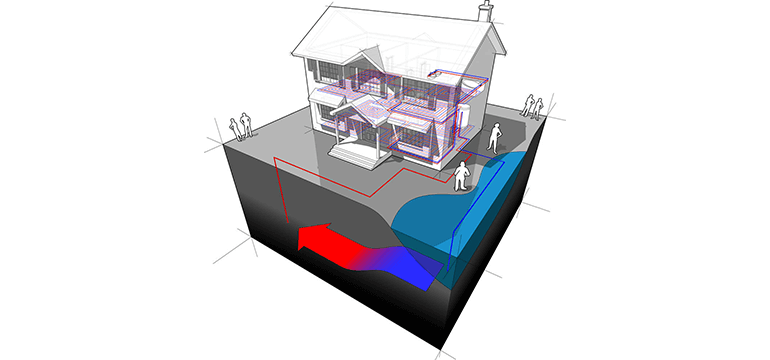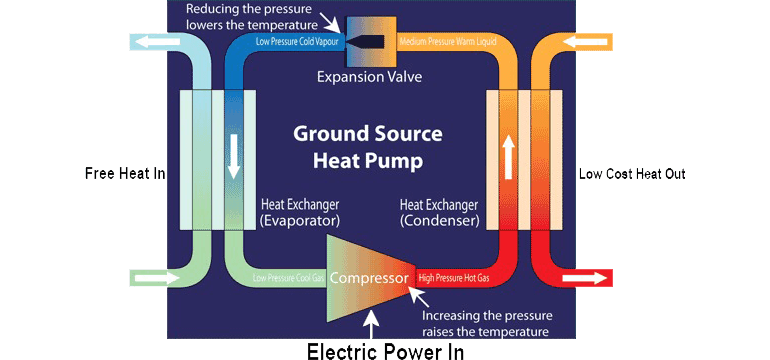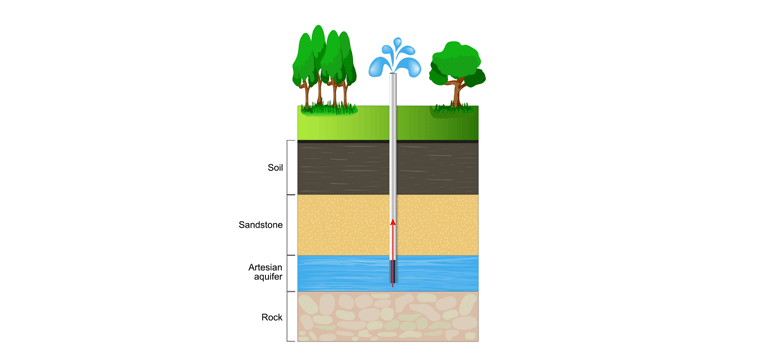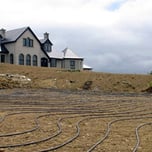Answer these simple questions and we will find you the BEST prices
Which type of solar quotes do you need?
It only takes 30 seconds
100% free with no obligation

Get up to 4 quotes by filling in only 1 quick form

Install a heat pump for less with the BUS grant

We’ve helped over 500,000 homeowners reduce their carbon footprint
- GreenMatch
- Ground Source Heat Pumps
- Open Loop Ground Source Heat Pumps
Open Loop Ground Source Heat Pumps
What Is a Geothermal Heat Pump?
Heat pumps are devices designed to transfer thermal energy from a cold source to a hot space, that is, in the opposite direction of the natural heat flow. The criteria for the broader classification of heat pumps is based on the heat source. In that sense, heat pumps are divided into two types: air and ground.
If you're interested in finding out more about ground source heat pumps' pros and cons and gaining the necessary insight before making a final decision between the two types, it is highly recommended to consult with a professional in the field who can offer you tailored advice based on your circumstances.
If you're interested in more details about open-loop ground source heat pump costs for instance, just click the contact form below and Greenmatch will provide you with up to 4 quotes from our trusted suppliers. We can save you time researching and offer you more information so you'll be able to make the best decision for your home. Greenmatch services are free and there are no hidden obligations.
- Quotes from local engineers
- Payment by finance available
- Save £7,500 with BUS grant
It only takes 30 seconds



Open-Loop Ground Source Heat Pump Installation
Ground Source Heat Pumps can also be installed within water sources such as ponds, lakes, aquifers, etc. Among ground source heat pumps, the more general classification considers the nature of the circuit that carries the fluid responsible for exchanging heat with the ground (or water).
Closed-loop heat pump: a mixture of water and antifreeze flows through a closed network of pipes (known as the ground loop). In one part of the circuit, it exchanges heat with the ground (or with a pond, lake, or aquifer). In the other part, it exchanges that heat with the evaporator of the heat pump.There’s no contact between the working fluid and the ground and between the working fluid and the fluid of the heat pump at any point.

Illustration of an open-loop GSHP system
How Do Ground Source Heat Pumps Work?
Open-loop heat pump: groundwater is pumped from an aquifer or alike and carried to the heat pump, where, by means of the evaporator, transfers its heat. After that, that water is either re-injected into the ground or discharged at the surface. Thus, the heat source is the same as the fluid that runs through the circuit, and it has to be constantly replaced since it’s not re-circulated.
The video below explains how a ground source heat pump works:

10-15 meter below the ground surface, groundwater temperatures are relatively stable. In the UK the temperature increases by about 3°C per each 100 m depth, due to the geothermal gradient. Most of the year there is a temperature difference between above ground temperatures, groundwater temperatures, and below ground temperatures. The ground and the groundwater in the summer is colder than air and warmer than air in winter. Ground source heat pump systems use this difference in temperature to heat and/or to cool. Open-loop systems extract groundwater from the ground, and direct it through a heat pump and, ultimately, put back into the ground or released at the surface.
Open-loop systems are beneficial for heating and/or cooling demands of 100kW or more, e.g., large office complexes. Open-loop GSHP systems have the benefit of being more economical than closed-loop systems. Ground borehole water is used by open-loop GSHP as a heat source.

Open-Loop Ground Source Heat Pumps—Pros and Cons
Closed-loop is by far the most commonly used type of heat pumps. But that doesn't mean open-loop heat pumps don’t have some advantages over closed-loop. Let’s have a look at them, and compare them with the disadvantages.
Advantages of Open-Loop Ground Source Heat Pump
Lower installation costs: the installation of an open-loop ground source heat pump is generally cheaper than that of a closed-loop. As long as the necessary conditions for the installation of an open-loop heat pump are met, its simpler design and lower implementation costs can make it a less expensive option than a closed-loop. This shouldn't, however, be regarded as a universal rule; each case has to be looked at individually to determine whether an open-loop heat pump is truly cheaper to install than a closed-loop according to the specific conditions of the case.
Ground source heat pump sizing: the fact that open-loop ground source heat pumps only demands a borehole to pump water from an aquifer (in contrast to the grid of pipes that make up closed-loop systems), makes them more suitable for situations where space is a major limitation. The ground source heat pump borehole will pass the soil, the sandstone, and then reach the artesian layer also called an aquifer (the rock layer is left untouched). This difference can be explained
This difference can be explained by pointing out that the groundwater heat is directly extracted in an open-loop system. Whereas in a closed-loop system, it’s transferred to a working fluid, reducing the efficiency and increasing the area and intricacy of the ground heat exchanger.

Disadvantages of Open-Loop Ground Source Heat Pumps
Dependence on groundwater availability, open-loop systems relies on the presence of an aquifer or other sources of groundwater beneath the property where the ground source heat pump is intended to be installed. That constitutes a very limiting condition for their usage. In addition, factors such as the depth of the aquifer and its extraction/replacement rate need to be taken into account. By contrast, a closed-loop ground source heat pump doesn't demand any particular condition, since it’s a self-contained system and the temperature of the Earth’s crust is constant everywhere all year round. Hence, it can be installed anywhere.
Has this sparked your interest in closed-loop ground source heat pumps? GreenMatch is here to do all the hard work on your behalf by providing up to 4 free and optional quotes from our network of professional providers. Get started in less than a minute by simply clicking the form below!
- Quotes from local engineers
- Payment by finance available
- Save £7,500 with BUS grant
It only takes 30 seconds



Regulations
Closed-loop systems are not regulated by environmental agencies; open-loop systems are. The reason for this is that open-loop systems alter their energy source by the extraction of water from the aquifer, that could, in turn, affect the characteristics of the ground and, eventually, result in the desiccation of the aquifer, while closed-loop systems are limited to exchanging heat with the ground (or groundwater), thus does not alter the environment.
Maintenance of Ground Source Heat Pumps
Once a closed-loop ground source heat pump has been installed, it’s not necessary to check or maintain the ground loop. Being a closed, self-contained system, the quantity and quality of the working fluid won’t vary. Subsequently, there’ll be no need for periodical maintenance. On the other hand, the continuous extraction and release of water that takes place in an open-loop ground source heat pump cannot guarantee that optimal water conditions are met. That could affect, for example, the performance of the heat exchange at the evaporator and could even damage the pump that circulates the groundwater.
Ground Source Heat Pump Prices
The annual cost of operating a ground source heat pumps is around £1,130 per year, for a medium sized home. The ground source heat pump installation costs can vary and can be somewhere between £13,000 and £35,000.
The price can vary depending on the size of the system, and extra work required in addition to the pump installation—like an underfloor heating system. Vertical systems are significantly more expensive than horizontal systems, thanks to the ground source heat pump borehole costs.
For a detailed overview of prices for the installation please see Prices of Ground Source Heat Pumps. Also be sure to check out whether your eligible for any ground source heat pump grants that can help cover the installation costs.
If you're interested in knowing more about open-loop ground source heat pump costs, just click the button below and Greenmatch will provide you with up to 4 quotes from our trusted suppliers. This will save you time researching and you'll be able to make a better decision for your home. Greenmatch services are free and there are no hidden obligations.
- Quotes from local engineers
- Payment by finance available
- Save £7,500 with BUS grant
It only takes 30 seconds



We strive to connect our customers with the right product and supplier. Would you like to be part of GreenMatch?




